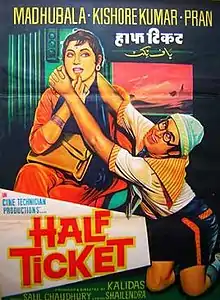Half Ticket
Half Ticket is a 1962 Indian Hindi-language comedy film directed by Kalidas and produced by Bombay Talkies. Starring Kishore Kumar, Madhubala and Pran, the film revolves around Vijay, a good-for-nothing young man who decides to leave his house when his father forces him to get married. He wants to start a new life in Bombay, so he pretends to be a child in order to obtain a train ticket.
| Half Ticket | |
|---|---|
 Film poster | |
| Directed by | Kalidas |
| Produced by | Bombay Talkies |
| Written by | Surid Kar Ramesh Pant |
| Starring | Kishore Kumar Madhubala Pran |
| Music by | Salil Chowdhury |
| Edited by | Raj Talwar |
Release date |
|
Running time | 168 min. |
| Country | |
| Language | Hindi |
| Box office | est. ₹1 crore (est. ₹119 crore as of 2011)[2] |
The film was a critical and commercial success and has gained cult status since its release in 1962. The Indian Express had mentioned Half Ticket in its list of "10 Bollywood comedies to watch in your lifetime".[3]
Plot
Vijay (Kishore Kumar) is the good-for-nothing son of a rich industrialist, who becomes bored of his father's constant railing and the efforts to marry him off, with the intention of getting him "settled" in life. So Vijay walks out of his home and decides to leave for Bombay and start life afresh there, however he does not have enough money for a ticket.
Vijay gets a burst of inspiration from a plump child called Munna, who is waiting in line with his mother (Tun Tun), and decides to pass himself off a child in order to get the eponymous half-ticket.
Now disguised as Munna, Vijay is used as a mule for a diamond smuggler (Pran) without his knowledge. On the train, Vijay also meets Rajnidevi (Madhubala) and falls in love with her.
The rest of the film follows Vijay's exploits as he avoids capture by the diamond smuggler and his girlfriend (Shammi), romances Rajnidevi while avoiding her auntie-ji (Manorama), and reunites with his father.
Cast
- Kishore Kumar as Vijaychand vald Lalchand vald Dhyanchand vald Hukumchand alias Munna / Vijay's Mother
- Madhubala as Rajnidevi / Asha
- Pran as Notorious Thief Raja Babu aka Chacha
- Shammi as Lily Raja Babu's Mistress
- Manorama as Asha's Aunty
- Pradeep Kumar as Special Appearance
- Moni Chaterjee as Seth Lalchand Vijay's Father
- Tun Tun as the Real Munna's Mother
- Helen as Stage Dancer in the song Woh ek Nigah (Special Appearance)
Soundtrack
Music composed by Salil Choudhury and all songs are written by Shailendra.
| Song | Singer(s) | Notes |
|---|---|---|
| "Chaand Raat Tum Ho Saath" | Lata Mangeshkar and Kishore Kumar | |
| "Aankhon Mein Tum" | Geeta Dutt and Kishore Kumar | |
| "Chill Chill Chilla Ke" | Kishore Kumar | Picturized on Kishore Kumar as he is dressed as Munna. |
| "Woh Ek Nigah Kya Mili" | Lata Mangeshkar and Kishore Kumar | Picturized on Helen and Kishore Kumar with Pran. |
| "Aake Seedhi Lagi Dil Pe" | Kishore Kumar and Kishore Kumar (both male & female voice) | Picturized on Kishore Kumar and Pran with Kishore in drag. |
| "Are Lelo Ji Lelo" | Kishore Kumar | |
| "Are Wah Re Mere Malik" | Kishore Kumar |
Release and reception
Half Ticket was released on October 19th, 1962.[4] Critic reviews were generally positive.
Sukanya Verma wrote, "Fabulous soundtrack, frolicking premise and frothy dialogues led by the King of Comedy (Kumar) and Queen of vivacity (Madhubala), there is nothing half-hearted about this [film]."[5]
Film Geek stated: "The movie makes a little more sense than that - only a little - but it matters not at all, as Kishore Kumar's limitless zany energy, Madhubala's irresistible charm, and several absolutely superb songs combine to make Half Ticket a delightful and hysterical ride."[6]
Box office
In India, the film had a box-office gross of ₹1 crore, with a nett of ₹0.5 crore, becoming the twelfth highest-grossing film of 1962.[7] The Best of the Year gave its inflation-adjusted nett as ₹251 crore.[8] Box Office magazine calculated its inflation-adjusted gross by comparing the collection with the price of gold in 1962, which gave it an adjusted gross of ₹119 crore in 2011.[9]
Legacy
Half Ticket is considered an important comedy film made in 1960s Bollywood.[10]
References
- "Half Ticket - Lifetime Box Office Collection, Budget, Reviews, Cast, etc". BOTY. Retrieved 21 December 2020.
- "Worth Their Weight In Gold! | Box Office India : India's premier film trade magazine | Bollywood news, reviews, interviews, box office collection". web.archive.org. 3 November 2011. Retrieved 5 December 2020.
- "Seriously Funny: 10 Bollywood comedies to watch in your lifetime". The Indian Express. 15 June 2020. Retrieved 5 December 2020.
- "Half Ticket - Lifetime Box Office Collection, Budget, Reviews, Cast, etc". BOTY. Retrieved 21 December 2020.
- Sukanya. "Half Ticket: Kishore Kumar's return ticket to childhood!". Sukanya Verma. Retrieved 21 December 2020.
- "Half Ticket (1962)". Filmi Geek. Retrieved 21 December 2020.
- India, Box Office. Top Earners 1962. boxofficeindia.com.
- "Half Ticket - Lifetime Box Office Collection, Budget, Reviews, Cast, etc". BOTY. Retrieved 5 December 2020.
- "Worth Their Weight In Gold! | Box Office India : India's premier film trade magazine | Bollywood news, reviews, interviews, box office collection". web.archive.org. 3 November 2011. Retrieved 5 December 2020.
- "Best Clean Comedy Films in Hindi in 100 years from 1913-2013". IMDb. Retrieved 5 December 2020.
External links
- Half Ticket at IMDb